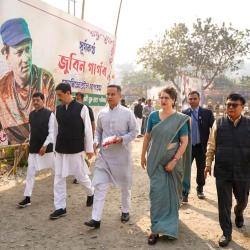A State level Convention on Climate Change, False Solutions and Indigenous Peoples Rights in Manipur was held on November 10. Jiten Yumnam, Secretary, Centre for Research and Advocacy, the organiser of the event, in his key note highlighted the context of deepening climate crisis in Manipur and how aggressive introduction of large scale development projects in Manipur, such as mega dams, oil exploration, creation of industrial zones and other large infrastructure projects such as Road and Railways infrastructure with financing by International Financial Institutions led to violation of indigenous peoples rights in Manipur by destroying their forest, water and land.
Phulindro Konsam, Chairman, Committee on Human Rights shared how development decisions and processes, such as new MoUs on mega dams are pursued against the aspirations of indigenous peoples of Manipur. Mega development projects are often anti people, destroyed their forest, water, agriculture land etc and involves human rights violations. All development processes should respect indigenous peoples self determined rights and their right to free, prior and informed consent.
Achom Brojen of Kongba and Nahakpam Ibochouba of Langthabal shared the concerns and the failure of the Asian Development Bank loaned Imphal Ring Road plan to consult and take the free, prior and informed consent of affected communities and to take detailed impact assessment due to such large projects. Gopen, Irabot Foundation elucidated how current day forcible development that benefit multinational corporations with their forced acquisition of agriculture land will undermine food sovereignty of Manipur.
Oinam Rajen, Secretary, All Loktak Lake Areas Fishermen Union spoke how the commissioning of the 105 MW submerged more than 80,000 acres of prime agriculture land and contributed in deepening climate crisis and how the National Hydroelectric Power Corporation remains unaccountable in Manipur, failing to rehabilitate and compensate those affected by their Loktak Project. Fishing communities were also evicted from Loktak Wetlands by the promulgation of the Manipur Loktak Lake Protection Act, 2006.
Dr. RK Ranjan, Senior environmentalist shared indigenous peoples have intrinsic relationship with our land and resources. Development processes in Manipur are often insensitive to the cultures, traditions and rights of indigenous peoples. Today, Manipur is unpredictable in its climate manifestations due to such insensitivities. Manipur is now forced to depend on outside for its food needs as a result of loss of agriculture land.
Dr. Y. Mani Khuman, President, AMUCO shared how introduction of development process is bereft of peoples participation and how such unsustainable development models contributed in climate crisis. There’s much inconsistence with the conduct of the Government which talks of protecting agriculture land while conscripting agriculture land for corporatization and privatization of our land and resources. Nganbileima Maibam shared on the fast shrinking wetlands and climate change implications and how communities depending on the wetlands are forcibly and mercilessly evicted.
The participants also adopted the following resolutions:
- Express concern with worsening climate changes in Manipur, frequent flood, drought, species loss etc and impact on indigenous peoples’ cultures, traditions and their survival.
- Expresses concern with aggressive pursuance of development processes, especially large scale mega development processes in Manipur with serious climate change implications, viz, mega dams, oil exploration and drilling, etc, which destroyed peoples’ land, forest, wetlands etc.
- Concerned with Government of Manipur’s MoU’s with corporate bodies for mega dams and to drill oil and gas in Manipur. The colossal forest area submergence of these mega dams, including 27,000 hectares, by the planned 1500 MW Tipaimukh dam etc will aggravate climate crisis.
- Express concern with the increased agriculture land grabbing by mega projects such as the Film Institute, Sports University, Trans Asian Highway and railway etc. Loss of Agriculture land will deepen climate crisis and undermine food sovereignty of Manipur.
- Concern with increased investment of International Financial Institutions, viz, Asian Development Bank for mega infrastructure projects such as Imphal Town Ring Road without detailed impact assessment, option assessment and consent of communities.
- Further concerned with the Manipur State Action Plan on Climate Change that prioritized false solutions to climate change, such as mega dams and REDD+ that will lead to negative impacts on indigenous peoples. All MoUs on Mega dams should be revoked and policies that facilitate such projects, viz, the Manipur Hydro Power Policy, 2012 and Manipur State Action Plan on Climate Change etc should be repealed.
- The National Hydroelectric Power Corporation should cease all efforts to seek carbon credits and additional profits from the Clean Development Mechanism by classifying the controversial 105 MW Loktak Project in Manipur as clean and renewable energy project.
- Express concern with the non recognition of indigenous peoples rights in forging out appropriate solutions in really mitigating climate change and in adapting to climate crisis.
- There should be moratorium on large scale destructive unsustainable development projects in Manipur, primarily mega dams’ construction, oil exploration, large infrastructure projects, which will destroy our forest, wetlands, agriculture land etc. Review Mapithel dam construction.
- Alternative energies, indigenous peoples’ traditional knowledge and practices such as diversified agriculture; community-based adaptation etc should be promoted in Manipur.
- The upcoming climate change negotiations in 20 COP at Lima Peru should ensure recognition of indigenous peoples self determined rights and development. The emphasis accorded on Private sector financing as solution to climate crisis in International climate negotiations should end urgently.
- The process of tackling global climate change has unfortunately been considered as an opportunity for economic benefits. Climate crisis cannot be resolved within the framework of “market solutions.” States should abandon all false solutions to climate changes that negate Indigenous Peoples’ rights.
- 6361 reads










Add new comment